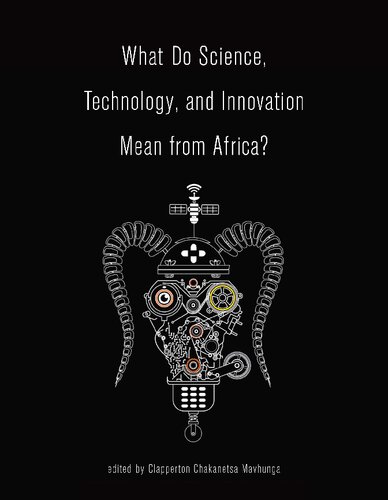

Most ebook files are in PDF format, so you can easily read them using various software such as Foxit Reader or directly on the Google Chrome browser.
Some ebook files are released by publishers in other formats such as .awz, .mobi, .epub, .fb2, etc. You may need to install specific software to read these formats on mobile/PC, such as Calibre.
Please read the tutorial at this link: https://ebookbell.com/faq
We offer FREE conversion to the popular formats you request; however, this may take some time. Therefore, right after payment, please email us, and we will try to provide the service as quickly as possible.
For some exceptional file formats or broken links (if any), please refrain from opening any disputes. Instead, email us first, and we will try to assist within a maximum of 6 hours.
EbookBell Team

4.3
78 reviewsExplorations of science, technology, and innovation in Africa not as the product of “technology transfer” from elsewhere but as the working of African knowledge.
In the STI literature, Africa has often been regarded as a recipient of science, technology, and innovation rather than a maker of them. In this book, scholars from a range of disciplines show that STI in Africa is not merely the product of “technology transfer” from elsewhere but the working of African knowledge. Their contributions focus on African ways of looking, meaning-making, and creating. The chapter authors see Africans as intellectual agents whose perspectives constitute authoritative knowledge and whose strategic deployment of both endogenous and inbound things represents an African-centered notion of STI. “Things do not (always) mean the same from everywhere,” observes Clapperton Chakanetsa Mavhunga, the volume's editor. Western, colonialist definitions of STI are not universalizable.
The contributors discuss topics that include the trivialization of indigenous knowledge under colonialism; the creative labor of chimurenga, the transformation of everyday surroundings into military infrastructure; the role of enslaved Africans in America as innovators and synthesizers; the African ethos of “fixing”; the constitutive appropriation that makes mobile technologies African; and an African innovation strategy that builds on domestic capacities. The contributions describe an Africa that is creative, technological, and scientific, showing that African STI is the latest iteration of a long process of accumulative, multicultural knowledge production.
Contributors
Geri Augusto, Shadreck Chirikure, Chux Daniels, Ron Eglash, Ellen Foster, Garrick E. Louis, D. A. Masolo, Clapperton Chakanetsa Mavhunga, Neda Nazemi, Toluwalogo Odumosu, Katrien Pype, Scott Remer